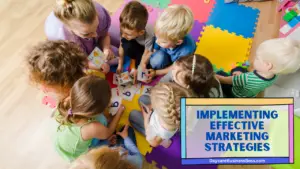The possibility of opening a prosperous daycare is both satisfying and hopeful in a world where parents are looking for dependable, secure, and nurturing childcare solutions. It takes meticulous preparation, commitment, and a great awareness of numerous factors to get from visualizing a caring haven for kids to building a flourishing business that supports their holistic development.
To launch a thriving daycare, you should meticulously plan the space and facilities, adhere to licensing regulations, craft engaging curricula, hire qualified staff, prioritize safety protocols, implement effective marketing, and foster strong communication with parents for mutual trust and satisfaction.
This article digs into the critical processes and tactics that prospective daycare entrepreneurs must follow to build a daycare that not only meets but surpasses parents’ expectations while providing children with a stimulating environment to learn, play, and grow.
Meticulous Planning of Space and Facilities
The foundation of a thriving daycare is rigorous planning of the physical environment and amenities. This includes a thorough examination of different elements, such as space organization, room compartmentalization, and the implementation of safety measures. A critical feature is the creation of distinct zones geared to different age groups. Each of these locations must be both safe and intellectually stimulating, providing an environment suitable for both learning and enjoyment.
The inclusion of furniture, toys, and educational tools appropriate to the developmental stages of the children is required for the facility’s interior. These aspects work together to provide a stimulating environment that promotes cognitive growth. Ventilation, natural light access, and strategically situated emergency exits are non-negotiable infrastructure characteristics. They not only ensure physical well-being, but they also foster a sense of security in children, parents, and carers.
In addition to the inside environment, a well-planned outdoor space is essential. This area extends the learning environment by providing children with opportunities for physical exercise and discovery. A well-designed outdoor space promotes gross motor development, imaginative play, and a deep relationship with nature.
Adherence to Licensing Regulations
Following licensing rules is an unquestionable requirement in the daycare profession. The importance of this compliance cannot be stressed, as it serves as the foundation for a safe and respected daycare organization. To embark on this road, a thorough understanding of local, state, and national regulations is required. Extensive investigation is required to uncover the intricate intricacies that regulate daycare operations within the individual jurisdiction.
Mandates that cover a wide range of topics are central to these regulations. Among these are requirements for staff-to-child ratios, which are critical for providing a safe and suitable environment for young charges. These ratios ensure that each kid receives the specialized care they require, effectively fostering their developmental needs. The regulatory framework includes health and safety regulations that cover everything from cleanliness routines to facility safety precautions. These rules indicate a strong commitment to the well-being of the children entrusted to the care of the daycare.
Licensing requirements dive into the qualifications and background checks of the employees. These tests are intended to reassure parents that the personnel caring for their children are competent and ethical. The extensive paperwork and rigorous application process that come with obtaining the proper licenses demonstrate the daycare’s commitment to authenticity and dependability.
Crafting Engaging Curricula

Creating an engaging and enlightening curriculum is a critical pillar in the foundation of a thriving daycare. This work necessitates dexterity and precision since it serves as the compass that guides the developmental journey of the children in your care. The key premise here is customization—each activity is precisely crafted to meet the unique demands and developmental stages of various age groups. This technique promotes a dynamic and purposeful setting that promotes holistic development across cognitive, social, emotional, and physical domains.
The curriculum design must be consistent to develop well-rounded persons. Activities should go beyond rote learning, focusing on the development of creativity, critical thinking, and problem-solving skills. The daycare provides a fertile ground for young minds to thrive and evolve by including these themes in the curriculum.
Well-structured schedules that orchestrate a healthy balance of play, learning, and rest are also essential. Playtime fosters the attitude of discovery and collaboration, whilst learning parts instill a feeling of wonder in information. Adequate rest is woven into the activity tapestry, recognizing the necessity of rejuvenation for healthy cognitive and emotional performance.
The constant change of curriculum is an often overlooked facet of curriculum development. Regular modifications are required to ensure its relevance in an ever-changing educational setting. The daycare continues at the forefront of delivering a modern and comprehensive learning experience by connecting the curriculum with current educational standards.
Read more about: Rising Stars: Daycare Business Development Essentials
Hiring Qualified Staff
The selection of daycare employees has a significant impact on the quality of care and educational experiences provided to children. These folks have an impact that goes beyond simple supervision; they create loving situations that stimulate growth. It is critical to approach the recruitment process with a critical eye and a firm awareness of the characteristics that characterize greatness in childcare.
The holding of relevant educational qualifications, ideally in early childhood education or closely related subjects, is a key consideration in employee selection. Such credentials reflect not just a fundamental understanding of child development but also an intelligent approach to encouraging growth. Hands-on experience dealing with children is vital in addition to these certifications. Candidates with experience in daycare settings have a natural knowledge of the role’s unique challenges and rewards.
Comprehensive reviews are required to achieve a seamless match with the daycare’s culture. Interviews that go beyond the surface qualifications delve into candidates’ motives and philosophies. Background checks and reference checks are critical safeguards for determining the appropriateness of individuals. These safeguards not only ensure the safety of the children but also foster a culture of trust and transparency among the daycare community.
The formation of a harmonious team is dependent on factors outside of the professional realm. The core of outstanding childcare personnel is a passion for fostering young brains, patience in guiding their curiosity, and an unshakable dedication to their well-being. These characteristics provide the groundwork for a collaborative team that elevates caregivers to mentors and companions on the children’s voyage of discovery.
Prioritizing Safety Protocols
Putting safety first in the childcare environment is an unrelenting commitment that emphasizes the well-being of every child entrusted to your care. The spine of this commitment is rigorous safety measures, which encompass various aspects critical to providing an environment in which children can thrive without compromise.
Hygiene, the foundation of good health, is at the forefront of safety measures. Handwashing, toy sterilization, and area disinfection are all part of the careful cleanliness regimens. These activities serve as barriers to the spread of germs, producing an environment conducive to health.
The guarantee of preparation in the face of emergencies pervades the daycare’s philosophy. Regular exercises instill detailed emergency procedures in the collective psyche of staff members. These drills train students to respond quickly and effectively, transforming them into calming anchors in times of crisis. Children are gradually introduced to these drills to reduce fear and empower them with information.
Individual health inspections stand out in the rich fabric of safety. Regular screenings ensure the early discovery of any health problems, allowing for prompt intervention and containment. Allergies, medical conditions, and emergency contacts are scrupulously updated and kept, providing critical touchpoints in times of need.
Facility inspections and maintenance are the foundation of a long-term commitment to safety. Regular assessments of the physical environment guarantee that childproofing measures remain strong and effective, averting possible threats. The daycare maintains its distinction as a haven for growth and learning by sustaining high safety requirements through ongoing attention.
Implementing Effective Marketing Strategies

Creating an effective marketing plan is critical not just for attracting parents, but also for carving out a distinct and trustworthy niche in the competitive landscape of daycare providers. The foundation of this undertaking is a multifaceted strategy geared to the sensibilities of modern parents.
A professionally designed website develops as a critical pillar. It acts as a digital portal via which parents get their first impressions. This platform should elegantly highlight the daycare’s distinguishing features, such as its caring environment, innovative curriculum, or highly qualified staff. A thorough depiction of facilities and resources, combined with insights into the well-planned curriculum, creates an immediate impression of transparency and credibility.
Social media, a powerful instrument in today’s digital arena, proves to be an excellent ally in displaying the vibrancy of the daycare. Regular updates that highlight the engaging activities, cheerful smiles, and day-to-day experiences of children in your care offer a candid glimpse into the wonderful world of your daycare. These peeks not only pique the interest of prospective parents but also offer an accurate picture of the love and learning that characterize your institution.
The technique could be expanded outside the virtual domain by providing open houses or virtual tours. These efforts give parents an immersive experience that allows them to see the nurturing atmosphere firsthand. The willingness to welcome parents into the actual environment reflects the daycare’s commitment to transparency and trust in its offerings.
Read more about: Web-Wise Childcare: Unveiling Daycare Center Marketing Techniques
Fostering Strong Communication with Parents
Open and honest communication with parents is essential for building a strong and trusting relationship between a daycare and the families it serves. When painstakingly built, this communication bridge acts as a conduit for understanding, reassurance, and communal growth.
The construction of effective communication channels is a critical aspect of this design. Regular newsletters, emails, or specialized apps serve as modern methods for the daycare to provide parents with a regular stream of updates. These updates provide information about daily activities, significant milestones, and any areas of concern that parents should be aware of. Parents are assured of their child’s well-being and participation within the daycare community by providing a look into their child’s experiences.
Encouraging parents to participate in this discourse by sharing their thoughts and concerns fosters a culture of mutual respect and understanding. This mutual interaction not only provides significant insights into the children’s needs but also demonstrates the daycare’s dedication to actively listening and addressing issues.
Parent-teacher conferences, a long-standing practice, offer a dedicated forum for in-depth conversations regarding a child’s development and opportunities for improvement. These small-group sessions promote a holistic view of a child’s growth and allow parents to actively engage in their child’s educational journey. Such discussions extend beyond academics, touching on social, emotional, and behavioral aspects that contribute to a child’s development.
Mutual Trust and Satisfaction
The achievement of a daycare is a symphony of well-coordinated efforts that come together to produce an environment that fosters mutual trust, satisfaction, and progress. Each intricately coordinated facet contributes to a harmonious whole that appeals to both parents and children.
The most important part is the careful arrangement of space and facilities. The canvas on which the daycare’s vision is painted is a setting favorable to play, learning, and safety. Regulation adherence ensures that the structure is constructed on a solid foundation of legal compliance, indicating an institution’s commitment to professionalism.
Creating interesting courses is like growing young minds in a garden of possibilities. This intentional design tailors activities to different age groups, supporting holistic growth and sparking a love of learning. The daycare cultivates a community of caregivers competent at harnessing children’s potential by selecting qualified employees with educational qualifications and appropriate experience.
Safety is a steadfast pillar. This focus on well-being pervades every part of the daycare, from hygiene regulations to emergency exercises. Effective marketing techniques, such as polished websites, social media involvement, and experience opportunities such as open houses, communicate the essence of the daycare to parents.
The tapestry is completed by open and robust communication. Regular updates, feedback mechanisms, and parent-teacher conferences help to build a bridge that fosters understanding and collaboration. This virtuous circle instills trust in parents, resulting in wonderful referrals and long-term connections.
Within this well-nurtured ecology, children thrive. They thrive in an atmosphere that fosters their cognitive, social, and emotional growth because they are nurtured by skilled professionals, surrounded by a haven, and enriched by deliberately organized curricula.
Frequently Asked Questions

What are the most important aspects to consider when designing a daycare’s physical space?
The physical area of the daycare must be meticulously planned to create a safe and exciting atmosphere. Room layout, age-appropriate zones, natural light, ventilation, safety exits, outside play space, and childproofing techniques are all factors to consider. It is critical for children’s holistic development to ensure that the environment accommodates both educational programs and playtime.
How can I ensure that my childcare meets licensing requirements?
Following licensing rules is critical for your daycare’s validity and trustworthiness. Investigate and comprehend local, state, and national regulations concerning staff-to-child ratios, health and safety requirements, staff qualifications, background checks, and other topics. Completing appropriate documentation, obtaining required licenses, and constantly updating your procedures to ensure compliance with regulations will reflect your dedication to maintaining a high quality of care.
How do I develop a fun curriculum for my daycare?
Making an interesting curriculum entails adapting activities to various age groups and fostering holistic development. Activities that promote creativity, critical thinking, and problem-solving should be included. Create timetables that balance play, study, and rest. Update the curriculum regularly to fit with educational standards and the changing requirements of the youngsters. You can keep children interested in learning and exploring by providing a variety of activities and experiences.
To learn more on how to start your own daycare checkout my startup documents here.
The information provided by DaycareBusinessBoss.com (“The Site”) is for general informational purposes only. All information on the Site is provided in good faith, however, we make no representation or warranty of any kind, express or implied, regarding the accuracy, adequacy, validity, reliability, availability or completeness of any information on the Site. Under no circumstance shall we have any liability to you for any loss or damage of any kind incurred as a result of the use of the Site or Reliance on any information provided on the Site. Your use of the Site and your reliance on any information on the Site is solely at your own risk.
This blog post is for educational purposes only and does not constitute legal advice. Please consult a legal expert to address your specific needs. Terms and Conditions. (https://daycarebusinessboss.com/terms-conditions/)

Meet Shawn Chun: Entrepreneur and Childcare Business Fan.
I’m a happy individual who happens to be an entrepreneur. I have owned several types of businesses in my life from a coffee shop to an import and export business to an online review business plus a few more and now I create online daycare business resources for those interested in starting new ventures. It’s demanding work but I love it. I do it for those passionate about their business and their goals. That’s why when I meet a childcare business owner, I see myself. I know how hard the struggle is to retain clients, find good employees and keep the business growing all while trying to stay competitive.
That’s why I created Daycare Business Boss: I want to help childcare business owners like you build a thriving business that brings you endless joy and supports your ideal lifestyle.


